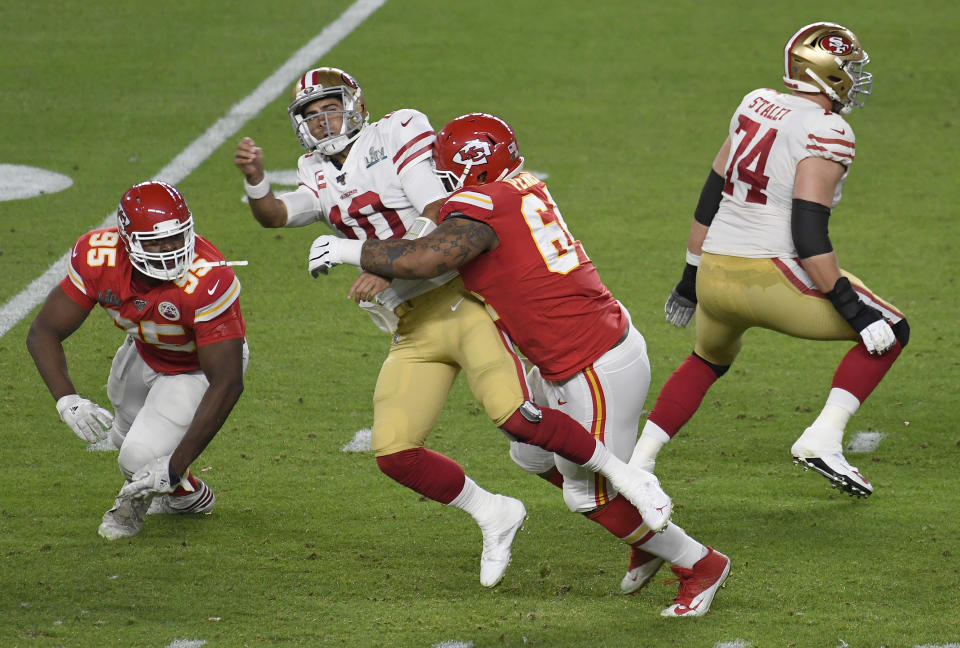Did the 49ers' Super Bowl loss save lives in San Francisco?

Back in the Super Bowl — which seems like three years ago, but was only two months ago — the San Francisco 49ers held a 10-point lead over the Kansas City Chiefs in the fourth quarter. Niners fans, a generation removed from their last Lombardi Trophy, were preparing to celebrate the start of a new dynasty.
You remember what happened next. Patrick Mahomes found his touch, the Chiefs went on a scoring rampage, and Kansas City won 31-20. The city of San Francisco was heartbroken, but as the Wall Street Journal is reporting, researchers now are suggesting that the loss may have helped the city avert a much greater tragedy.
The first cases of coronavirus had just shown up in California, and local medical officials were working furiously to keep the virus contained. In fact, the very first patients with coronavirus in California were transferred to the hospital at the University of California-San Francisco the morning after the Super Bowl loss.
But had the 49ers won, there would have been a parade. Hundreds of thousands of people would have crowded into a small stretch of San Francisco streets. And the virus could have spread, undetected, through parade-goers, and everyone they then contacted, again and again.
“It may go down in the annals as being a brutal sports loss,” Dr. Bob Wachter, the chair of UCSF’s department of medicine told the WSJ, “but one that may have saved lives.”

San Francisco has drawn praise for the way its long-term planning and decisive action have apparently contained the coronavirus outbreak. But an exponentially larger number of cases could have overwhelmed the city’s medical resources. Coronavirus was already present in California, and could have spread easily in a seven-figure crowd.
A parade would have drawn as many as a million people to downtown San Francisco, and, as the WSJ notes, would have been a dark echo of a similar event during the 1918 Spanish flu outbreak: an ill-fated decision in the city of Philadelphia to host a wartime morale parade. More than 200,000 people attended that parade, many infected with the deadly influenza, and the parade served as a “super-spreader” event that magnified Philadelphia’s pain. That parade has served as both a warning and a justification for the current social distancing and quarantining under which the country now operates.
There’s justification for caution about mass gatherings. Two weeks after the Super Bowl, Atalanta met Valencia in a Champions League match in Milan, Italy. More than 40,000 Atalanta fans traveled from the Italian city of Bergamo to the match ... and, weeks later, Bergamo was the epicenter of the northern Italy coronavirus outbreak. Researchers have pinpointed that match as a super-spreader event, with one scientist going so far as to call it a “biological bomb.”
The potential near-miss in San Francisco is also reminiscent, in a way, of the 2008 SEC men’s basketball championship. A game between Mississippi State and Alabama went into overtime right as a tornado hit downtown Atlanta. Had the game not continued, thousands of fans spilling out of the Georgia Dome would have been on the streets of Atlanta and exposed when the tornado hit.
It’s impossible to predict with accuracy the way that an under-the-radar virus would spread through a hypothetical Super Bowl parade. But 49ers fans still stinging from losing the Super Bowl can take some comfort in the fact that it could have been so much worse.
_____
Jay Busbee is a writer for Yahoo Sports. Follow him on Twitter at @jaybusbee or contact him with story ideas and tips at jay.busbee@yahoo.com.
More from Yahoo Sports:

